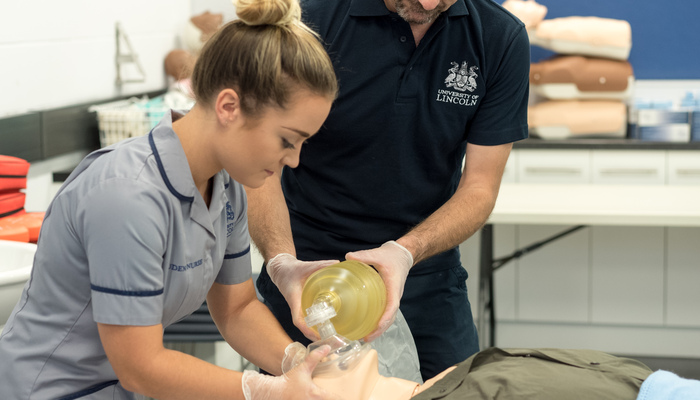Nursing at Lincoln
Developing future-ready nursing professionals
Equipping nurses with critical decision-making skills
Enhancing healthcare quality and leadership
Promoting strong interdisciplinary collaboration

Developing future-ready nursing professionals
Equipping nurses with critical decision-making skills
Enhancing healthcare quality and leadership
Promoting strong interdisciplinary collaboration

Comprehensive Curriculum: The programme covers seven key platforms, including being an accountable professional, promoting health, assessing needs, providing care, leading teams, improving safety, and coordinating care. This is delivered over 45 weeks of study per year, over three academic years.
Practical Skills: Learners will develop essential nursing procedures and communication skills, ensuring they can provide person-centred care across various settings.
Holistic Approach: The curriculum emphasises emotional intelligence, resilience, and the ability to work autonomously or in interdisciplinary teams. The Nursing and Midwifery Council (NMC) guidelines for student nurse teaching require that 2,300 hours of theory-based learning be delivered over the course of the programme. Learners are expected to gain comprehensive knowledge and skills in areas such as patient care, clinical decision-making, communication, and professional values. The curriculum is designed to ensure that students are well-prepared to meet the diverse needs of patients and work effectively within healthcare teams. Theory study involves; lectures, work-based projects, problem-solving exercises, class discussions/debates, presentations by subject matter experts and peers, group activities and independent study.
Students will receive continuous professional development both during their working hours and through their studies at the University. This ensures a comprehensive learning experience that integrates practical skills with academic knowledge.
The programme adopts a blended-learning approach with modules delivered through a combination of lectures, class-based seminars, practical work, and site visits. The module breakdown differs depending on prior experience and the nursing route chosen.
Route 1: Course Length: 36 months (Excluding End Point Assessment)
Route 2: Course Length: 18 months if already a registered nursing associate looking to progress to a registered nurse
Route 3: Course Length: 24 months for those that have completed FdSc Healthcare Practice at the University of Lincoln and are able to evidence the required practice learning hours.
All years of the course are designed around applied learning, connecting your studies to real-world situations in your workplace.
This applied learning approach ensures that you can immediately put theoretical knowledge into practice, enhancing your professional development.
You will progress through the programme following successful achievement of academic assessments, which address the learning outcomes for each module and allow you to complete End Point Assessment.
Applications can be from existing employees looking to develop their careers, or new applicants to the employer.
For all routes applicants must:
For Route 1 (3-year programme):
For Route 2 (18-month programme):
For Route 3 (2-year programme):
For other applicants with relevant work experience in nursing, we will consider each application on an individual basis to ensure that you are selecting the right level of programme.
If you are an employer:
If you want to offer this apprenticeship to an existing employee or a new recruit and have any questions, get in touch at nurseapprenticeship@lincoln.ac.uk.
If you are an applicant:
To apply for this apprenticeship, you must first have a suitable employer who can support your application. We can support you to encourage your employer to offer an apprenticeship. You will then apply for the programme through them.
At Lincoln, we have partnered with hundreds of businesses and public sector organisations, including the NHS and local councils, as well as industry giants Coca-Cola and Nestlé, to fulfil their training needs. Explore our range of apprenticeships to see how we can support you.
